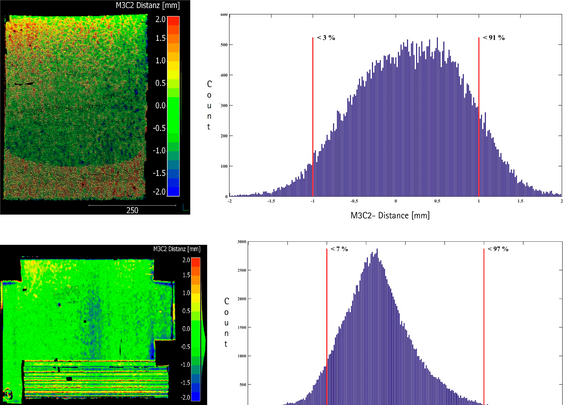Franziska Altemeier, M. Sc.
Erstbetreuer: I. Neumann; Co-Betreuer: B. Wagner
The collaboration of several multi-sensor systems (MSS) has the potential to compensate individual shortcomings, e.g. by sharing navigational information among the nodes of a dynamic sensor network. Within the context of autonomous driving knowledge of the quality of the collected data and the derived trajectory is of great importance. Therefore, uncertainty modelling and propagation is a crucial issue - starting from the single sensors along the entire process chain (e.g. including the calibration and synchronization of the sensors within each MSS) up to the resulting products like 3D mapping information of the environment and the trajectory of the MSS. Numerous investigations deal with more or less specific aspects of the quality assurance of an MSS. Within this doctoral project the focus lies on the quality modelling of the MSS under investigation by the research training group (RTG). Building on this, the gain by the collaboration of MSS for the uncertainty can be evaluated in a subsequent project.
To model the uncertainty of an MSS, two methodological approaches are distinguished in current research. On the one hand, relevant influencing factors can be identified using a sensitivity analysis. For those influences the uncertainty is then modelled and propagated to the parameters of interest, for example, by Monte Carlo simulations (forward modelling). The alternative method is to start with measurement results, whose quality is evaluated by comparison with reference values (backward modelling). The obtained results can then be used to validate the uncertainty model derived from the forward procedure. To use this method, prior knowledge about the functional relation and the distribution of selected influencing factors is required. Therefore, uncertainty modelling with the forward approach is a burdensome task if the number of influencing factors to be considered increases. In contrast, the backward strategy covers all influencing factors, but does not allow their separation.
On the basis of these properties, the aim of this research project is to develop an efficient methodology for the overall uncertainty modelling of an MSS, which additionally gives access to the most important influencing factors. Within this project the focus lies on MSS, that are built of terrestrial laser scanners (TLS) as the object-capturing sensor and additional sensors for the (geo-) referencing of the shared platform. The starting point is the analysis of data according to the backward modelling approach, namely (geo-)referenced point-clouds, that are partly available from the mapathons of the first cohort and will be completed and extended within the planned measurement campaign of the second cohort. To identify relevant influencing factors for the overall uncertainty budget of the used MSS, the deviation of the captured point-clouds from reference information like a point-cloud with superordinate accuracy shall be analysed with supervised machine learning techniques. For this purpose, regression models shall be applied and an artificial neural network (ANN) shall be set up. The current work package is therefore initially the generation of suitable training data.



Nienburger Straße 1
30167 Hannover
Nienburger Straße 1
30167 Hannover





